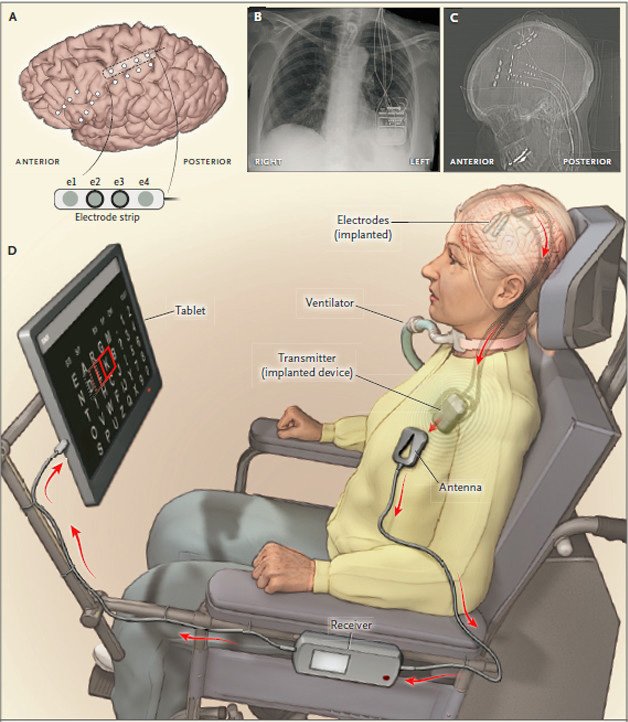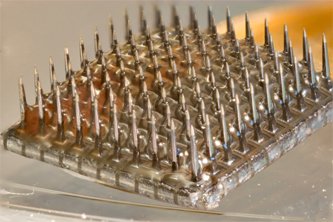
Imagine being at home, and clicking on your screen, with your mind? No kidding, this has been developed and tested on an ALS patient in the Netherlands.
What's the big deal? Hasn't there already been brain-computer interface technology? Yes. But it involves a lot of devices and connection so overall it's a large setup. Engineers need to daily recalibrate the devices, so its too complex for usual home use.
This new technology is much more convenient.
Previously, Hanneke De Brujine, a 58 year old woman, was using eye-tracking technology. She could not longer breathe requiring a respirator. Her eye movement could be lost as well. With the new technology, she won't need her eyes at all.
Selection of words on a screen, clicking with a mouse, can be controlled with the brain through thoughts. Electrodes are placed on the brain directly under the skull. Brain activity is recorded and sent through a wire to a device implanted in the chest area that then sends a wireless signal to a computer.

De Brujine had electrodes placed on the area of the brain for right-hand movement. After being trained t use it, she could play games, like pong and wack-a-mole. Six months of training has resulted in 95% accuracy. Things progress, but it takes time. Writing one word can take a few minutes on the computer. Initially it took 50 seconds to pick a letter that she can now do in 20 seconds.
Getting there took time, with 28 weeks of testing and refinement. It took several months to "weed" out and refine the algorithms to properly pick up what she wanted to do, and not register unintended brain clicks.
A drawback of the size and simplicity of the device, is that it limits the range of functionality and the amount of information that use.
Nick Ramsey at the Brain Center Rudolf Magnus of the UMC Utrecht, Netherlands, has learned from De Brujine and is working on making the tablet software smaller for the next volunteer to receive the technology, allowing them to learn to use the device more quickly. Better auto-complete software will help complete words as well. They are also working on other interfacing int he home, like turning a TV on or off, an oven, or other electrical devices.
Another researcher working with Ramsey's team in the Netherlands, Vikash Gilja, a professor of electrical and computer engineering at the University of California San Diego, has his own developments to aid in brain-computer interfacing. Instead of requiring to place the electrodes directly on the brain, new implants will have 100 electrodes fitting within 4 square millimeters, but will penetrates 1mm into the brain tissue instead of just sitting on top of it.

That's great for people to get a better quality of life when they have lost it physically. But let's face it, this is going to be wanted by regular people to for interfacing with computers on a daily basis. I'm sure the technology will get better too and less invasive. Not many people would opt for brain surgery to get to connect their thoughts to their brain... or would they? LOL.

@krnel
2016-11-23, 7:01pm
Downvoting a post can decrease pending rewards and make it less visible. Common reasons:
Submit
Resteemed
Downvoting a post can decrease pending rewards and make it less visible. Common reasons:
Submit
Hey there, do you think since you are kinda techy, you could comment with your ideas here??? Thanks for everything... BD
https://steemit.com/steemit/@barrydutton/steemit-needs-please-comment-with-your-ideas-to-improve-steemit-e-1
Downvoting a post can decrease pending rewards and make it less visible. Common reasons:
Submit
I was just saying that I 'll wait for the implants to bother with VR and such things. Mostly I want my AI assistant to be an implant. I've been following implant technology and it's coming soon. As long as the AMA and FDA don't get in the way.
Downvoting a post can decrease pending rewards and make it less visible. Common reasons:
Submit
Eeehhg, not sure how soon. I'd say a decade or more?
Downvoting a post can decrease pending rewards and make it less visible. Common reasons:
Submit
I'm thinking maybe a little sooner. Not this one, but simple audio and video inputs from an external device. We already have good audio implants which are fairly cheap, and I'm seeing animal testing of fairly decent video input. About half the innovation is in video implants and the rest is in contact lenses. I want the implants.
Downvoting a post can decrease pending rewards and make it less visible. Common reasons:
Submit
Interesting news. I hope there will be more breakthroughs in this field in the upcoming years. Resteemed and following you!
Downvoting a post can decrease pending rewards and make it less visible. Common reasons:
Submit
I wonder if they would use this kind of technology for MS patients as well. The electrodes might help in stimulating affected nerves - or be connected directly to the muscles to offset the debilitating effects of MS. Just a random thought.
Downvoting a post can decrease pending rewards and make it less visible. Common reasons:
Submit
Could be. I didn't read any mention of MS though for now.
Downvoting a post can decrease pending rewards and make it less visible. Common reasons:
Submit
This post has been ranked within the top 50 most undervalued posts in the first half of Nov 24. We estimate that this post is undervalued by $5.70 as compared to a scenario in which every voter had an equal say.
See the full rankings and details in The Daily Tribune: Nov 24 - Part I. You can also read about some of our methodology, data analysis and technical details in our initial post.
If you are the author and would prefer not to receive these comments, simply reply "Stop" to this comment.
Downvoting a post can decrease pending rewards and make it less visible. Common reasons:
Submit
This post has been linked to from another place on Steem.
Learn more about and upvote to support linkback bot v0.5. Flag this comment if you don't want the bot to continue posting linkbacks for your posts.
Built by @ontofractal
Downvoting a post can decrease pending rewards and make it less visible. Common reasons:
Submit
Thoroughly enjoyed you post and hope all is well on your end. I thought you might appreciate this story. A friend of mine just ran across the country to raise awareness for ALS.
https://steemit.com/life/@crypt0clown/a-run-across-the-country-3-000-miles-in-100-days-for-als
Downvoting a post can decrease pending rewards and make it less visible. Common reasons:
Submit